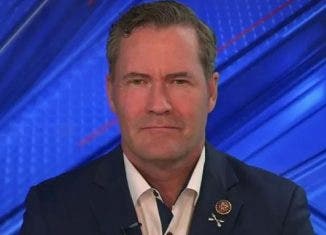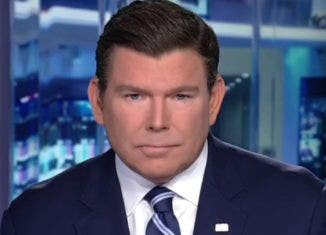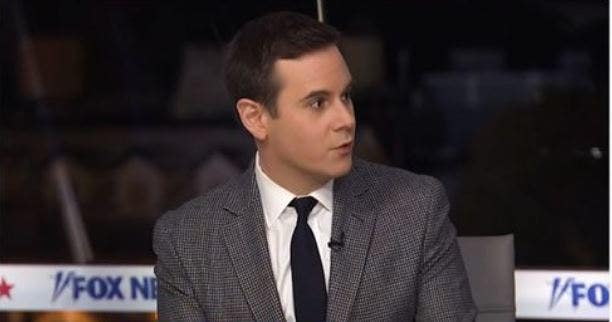Senior Trump National Security Advisor: The China Threat Is So Much Worse Than You Think
Brian Cavanaugh, who is currently a Senior Vice President for former National Security Advisor Robert O’Brien’s firm American Global Strategies talks to Guy about China and some of the national security threats that are much worse than we thought.
Listen Below:
Transcript below:
Guy Benson: We are halfway through the Guy Benson Show on this Friday in New York. Thanks for joining us. Guy Benson show.com podcast Always free. Well, earlier this week I was in South Carolina. We were doing the show from Charleston, and I was there for a conference, and we actually had a few guests on who were also at the conference with me. And one of the experts that we heard from is my next guest. I was unfamiliar with him before we got briefed about China and some of the national security threats that are. I’ll just say it much worse and much more advanced than even I realized. And I think that I’m, like, pretty clear eyed on China. It’s worse than I thought. And I remember having this general sense, we’ve got to get this guy on the show to talk about this. His name is Brian Cavanagh, and during the Trump administration, he served on the National Security Council as a senior director. So 2018 to 2021. While at the NSC, his portfolio included critical infrastructure, security, resilience, election security, domestic incident response and continuity of government. Now he works at a group called American Global Strategies, which was founded by former national security adviser Robert O’Brien, who of course, has been on this show multiple times. I traveled abroad with ambassador O’Brien, so we know him well. We like ambassador O’Brien a lot. And he brought Kavanagh on board to this firm where they’re doing from outside government work on some of the fronts that they were frankly obsessed with while in government. So Brian Kavanagh joins me now. Brian, it’s great to have you here. It was good to meet you earlier in the week.
Brian Cavanaugh: Guy, thank you so much. It was a pleasure meeting you, and I’m very humbled and honored to be on the show with you today.
guy Benson: And as you heard from my intro there, I kind of want to give the audience a deeper understanding of why I’m a deeper understanding of why the China threat is as severe and immediate as it is. Because part of me, perhaps naively, was thinking, well, the Chinese certainly are trying to do bad things, and they’re trying to infiltrate various elements of our society, and we really need to prevent them from doing that. And off in the future, things could get bad. And sitting, listening to your presentation. At least my biggest takeaway was. Enormous amounts of damage have already been done, and it’s possible that China could bring the country to its knees in a crisis already right now. Is that too harsh, or does that sound right to you?
Brian Cavanaugh: I think you summed it up perfectly. You couldn’t have been any more accurate. I think a long time has been where the viewpoint for China has been. They’re just an economic competitor, and maybe they play dirty in the economic trade space. But really, at the end of the day, that’s all they are. And it wasn’t until 2017 that you started to see a more open narrative about really at the time, it was intellectual property theft, espionage. But as we were taking a more serious look at that at the National Security Council and across the departments and agencies in the federal government, what we discovered was this is way past intellectual property theft and trying to get an edge in the economic field. They are truly positioning themselves to be able to be the not just an Asian hegemony but take a global leadership role and push everyone else off that platform, off the stage. I think they’ve adopted this approach where they would like to, to win that fight without ever having to fire a shot. And they’re doing that through, social malign influence. They’re doing that through a variety of other means, where they’re funding activist groups like BLM, and they’re funding Antifa through cut outs. But really, their their insurance policy for that is lately has been to camp out all over our critical infrastructure. And you’re starting to hear FBI Director Wray talk about the threats of water sector as a threat to the energy sector. Well, Guy, I’m here to tell you today, every single sector of critical infrastructure should be concerned, should have a heightened awareness of what’s happening. And that even goes all the way down to the individual level. When you think, why is TikTok such an important argument? It’s the amount of data that they’re able to vacuum up off of you and how they can use that to control perception optics, but even further blackmail, is you starting to actually see that through Chinese investments? If you’re investing heavily into certain Chinese companies, I think there’s a church group in the South that, that’s trying to look for this before we got on the show to find the, actual name. But they’ve been coerced into taking public positions based on their investments in China and the risk of losing their entire investment portfolio.
guy Benson: So coercive tax, so coercive tactics, in addition to other things that at least could prompt something of, you know, a free speech, free expression debate. As we’ve seen around TikTok, TikTok just seems like the lowest hanging fruit for us to take care of on this front. It doesn’t solve the problem at all, but at least it’s easy. It’s obvious, and we’ve done something about it. Finally, I’m glad that that’s happened, and I’m even more convicted that that’s the right thing to do, given some of the things that I learned listening to you earlier in the week. I just want to revisit something that you briefly said there about the funding and funneling of money into various dissident groups to try to spread acrimony and division within the United States. Of course, they’re using TikTok to do that, algorithms, etc. but do you think it’s possible just to tie this into a current major news controversy? Is it possible that the CCP is giving some money to these campus protests, campus encampments, and that sort of thing?
Brian Cavanaugh: Absolutely. I think you take a look at something, former President Trump said of his rally in Wisconsin earlier this week. And he and he highlighted the fact that all the signs look brand new, freshly printed, all these tents, these green tents across campuses all over the country are nearly identical. That’s not organic, grassroots, protest that is well-funded, well orchestrated activism. And one thing you have to do is just trace the money. Everything, all roads will lead you to your origin if you follow the money. I think that’s something that the Treasury Department should actively be doing with the FBI. Because I firmly believe that when you follow the money, you will find that the PLA, at some level, is funding these types of activist groups.
Guy Benson: That’s the military of China.
Brian Cavanaugh: Correct? That is the Chinese Communist Party’s military arm.
Guy Benson: There’s the supply chains issue as well. And that’s been a conversation, really, particularly since Covid, where people realized, oh my goodness, we rely on China for so many essential things, including some of the key ingredients to, for example, the drugs that keep us alive. If, let’s say, God forbid, a war broke out, whether it was taking Taiwan or something more direct vis-a-vis the U.S. and China, they could really just clamp down in ways that would extract a lot of pain from the United States because we are so hyper reliant on them. If you could just maybe flesh that out a little bit as well. Just to remind people of that component of concern.
Brian Cavanaugh: Absolutely. I think when you take a look at what we rely on for day to day life and what it comes from China, look at the ports of Long Beach, LA, and how much commerce flows into the United States. One direction, I might add. You’re not sending a lot back to China on these containers. Oftentimes, we’re sending these shipping containers back empty to be refilled and brought back to the United States from China. So in the event that you get a some type of a conflict in the Pacific, the first thing China’s going to want to do is try and keep the United States, out of any action they take with regard to Taiwan. In the first of all, you can do that is to disrupt the socioeconomic life of its citizens in America. And they could do that by easily just turning off the faucet and everything from household goods to toilet paper to, protective, the protective equipment, the PPE that people rely on in the hospital settings, that’s almost exclusively traversing from China. Import from China. So. When you look at the supply chains, I think there’s a couple things in the context of an an event with Taiwan that need to be considered by Americans. And that’s we saw what happened and I think you Covid, if anything, it taught the national security apparatus a valuable lesson about things that we probably were taking for granted in terms of, looking at the supply chain, looking at certain relationships we had on the international stage and how how consistent allies and partners are. But the eye opening has been the tale that follows the supply chain crisis. When you look at the semiconductors and the impact to the automobile industry. Right. Look at what you if you’re in the tech sector, the inability to move semiconductors on a global scale that affects everything we do. So one of the things I’ve been really excited to see is not just chips act and getting investment in building here, but you’re seeing outside investment, not government funded investment. I think Samsung is spending $40 billion to build fabs in Texas. Intel is spending above and beyond what they’ve received from chips. There’s really been a double down on the fab sector. The production side of semiconductors in a much more diversified geographic.
Guy Benson: I mean, it’s so in points like existential, right? You think about semiconductors, you think about different components and parts to essential goods that keep our society running, not to mention the medicines and the drugs that I talked about. That is something to think about and I think to worry about. Then you also touched upon our critical infrastructure. So forget the supply chains. I am very worried based on what you were telling us. And you of course, were not revealing any classified information, but you were sharing with us that when it comes to our water supply, when it comes to our electricity grid, it sounds to me at least again, what I heard was the Chinese are not only probing for weaknesses and trying to gain access, they’ve already gained access, like if on a dime. Tomorrow they decided to push a few buttons in Beijing. They could really cause problems with our water supply, and they could take out in large swaths of the country our electrical grid, which could truly just cause our society to descend into self-immolation chaos in very short order. Is that overstating it, or do you think that they have us really in a very vulnerable spot already?
Brian Cavanaugh: I mean, when you say it, it sounds terrifying, doesn’t it? Yes, I believe that’s right. Where we are at. We’re at the precipice of understanding that it’s no longer a this probing and feeling where the vulnerabilities are. They’ve already they’ve been doing that for years, possibly decades. And if there’s any adversary we should be worried about in terms of cyber. The number one threat in the cyber sphere for the United States is China. Director Wray from the FBI is mentioned. If he took all of the Bureau’s resources that are countering hackers globally and put them only against China, China would still outnumber him 50 to 1 in terms of the amount of hackers trying to penetrate U.S. systems and trying to take on critical infrastructure.
Guy Benson: Well, and they’ve had success in some pretty high profile ways in the private sector and getting into some government records. That seems to me like kind of a show of force from time to time. I am deeply worried that some of these critical infrastructure elements are already compromised.
Brian Cavanaugh: If you look at Vault Typhoon, which was pretty revealing this past, spring when we started to peel back what we learned from the vault typhoon. Hacking discovery that was announced is targeted to critical infrastructure all around the Indo-Pacific. So they had a team working specific geographic regions, deliberately trying to find ways to slow down the U.S. Navy’s ability to project force into the Pacific. So this they have an entire team doing that? Just think they probably have entire teams targeting the energy sector, an entire team targeting the water sector. This is the asymmetric. And the word asymmetric is used so often anymore. But when an average American hears the word asymmetric, they should think that’s a military trying to target you from afar.
Guy Benson: To win a war without even starting a war, necessarily, or firing a shot. If you can essentially shut down the United States and turn this place into a basket case where people don’t have electricity, their cell phones don’t work. I mean, it’s like apocalyptic stuff. You have one right there. And it sounds like maybe they don’t control everything. Of course, that’s their ambition, I think. But the degree to which we are already compromised today, I think, is really important for people to understand. A lot of this is not preventative anymore. It is unrolling what they’ve already done to us. And on that front, I want to ask you about two more topics. Number one being surveillance, what you are able to tell us about how China is surveilling the United States, not just that one spy balloon, but some of the things they’ve been caught doing and where they’ve been caught doing it. And then if you’re able to share the story, you called it a funny story. You said, this is going to add some levity to your presentation at the symposium. And then to me, it was actually the scariest thing that you said about a meeting in the white House Situation Room. If you’re able to summarize that story, I think it speaks volumes.
Brian Cavanaugh: Well, let’s start with the first the first piece, if we can. And in just taking taking that into account, when you look at. They’re certainly past the point of like we’ve mentioned, they’re not collecting intelligence anymore. They’re looking to act and the ways in which they’re doing it. They’re assisting you look at the south, the southwest border, for example, there. There’s clear evidence that China is assisting the cartels in the in the move. And probably if you think about the fentanyl trade, think of it in terms of a senior partner and a junior partner. The cartels are really just the junior partner in this this epidemic. The senior partner or the managing partner, if you will, is China. And so the cartels are utilizing drone technology. They can predict, pattern of life on our CBP officers along the southwest border. They’re collecting all kinds of not just facial recognition software, but just tracking vehicles, tracking the individual officers. We’re having over 1000 drone incursions on the southwest border per month, and we’ve taken no actions to stop it. They’re using technology to help the flow of human human trafficking and doing that to aid in fentanyl trafficking and possibly human trafficking of the folks that we really don’t want into this country that are slipping by as, unknown, got aways.
Guy Benson: Everyone know and we know of tens of thousands of them. Then there’s the ones we don’t know about. By the way, you mentioned drone technology that just pinged another synapse in my brain of something that you guys were talking about, the extent to which we rely on our own drone technology on China, including like the vast majority in a lot of places of law enforcement. The technology is all Chinese. The companies are Chinese. I mean, some of the things that we would rely on to maybe restore order or keep law and order or defend ourselves, at least have Chinese components. We have no idea how deeply burrowed they are into some of these systems. They’ve been very deliberate about this, very intentional, very crafty for many years. And you’re also telling us a story about where they have been caught setting up cameras, whether, you know, through local TV stations offering like, hey, here’s this expensive camera for free, please point it in this direction is a traffic camera, but oh, it just happens to be pointing toward a military base where some other military or, you know, intelligence related installation. Enough of those examples have cropped up all over the country that it’s impossible to call it a coincidence, right?
Brian Cavanaugh: Correct. And it’s all kinds of data gathering, whether it’s a camera or it’s a sensor that’s a license plate reader. They make these technologies, they’re heavily subsidized. They’re cheap. They’re able to sell them. They’re they can undercut any competitor in the market. And it looks like a great deal for a municipality. But little does the municipality recognize the fact that they’re basically co-opting Chinese espionage. And they’re very selective in, in the environments they want to be in, where they want to be, what their interests are. So that that’s, that’s frightening and that’s happening all over the country. You mentioned the, you know, the military installations. That’s been a problem for years. And I think, you know, we’ve done tremendous work. Push to get Huawei out of our systems. Huawei was the backbone that was facilitating a lot of the threat there.
Guy Benson :That’s the wireless company, correct?
Brian Cavanaugh: And the big my worry is when you look at how they do business, we like to use lists in this country, and we’ve banned companies on lists, and we prohibit actions on a list. It’s not hard to restart a company, you know, get a new LLC, rebrand, rename, move on, same technology, and then they can bypass the list or, you know, as they get more creative. Yep. I think there’s, some information going around about, real estate in Maine and a lot of Canadian LLCs. Maine real estate, agricultural real estate. Well, you start pulling back that first, that first layer of the onion. And those LLCs are being set up by Chinese nationals.
Buy Benson: Yeah. I mean, again, not coincidental. And it’s just so many different pockets of espionage and infiltration that it’s hard to keep up with all of it. Another thing that you guys told us earlier in the week was, in some ways, because you guys can tell through various technologies when certain spying apparatus from the Chinese are looking at, let’s say, a military base and like, you know, from from outer space or what have you, you can tell, okay, they’re looking at this right now. And you said in a lot of cases they’ve just moved past all the military installations. Like they they feel confident that they know that inside and out. And they have turned instead to, you know, railways and other elements of infrastructure. They’re mapping out the whole country, basically, and figuring out ways to, compromise or take over all sorts of different elements that are central to a functioning American society. That gave me a bit of a chill, as did finally, this story about how our system here at home is we’re trying to protect ourselves and combat this threat from China. We are doing a better job of keeping our secrets from each other within different agencies than we are from the enemy, from the adversary. If you can maybe share that story. I thought it was very telling. If you need to tell, like a very vague version of it, that’s fine. But to me it was my biggest concern walking away from that meeting.
Brian Cavanaugh: I think anecdotally, what you can, what we can share here and tell you is, you know, we go through great lengths to vet us persons that work on, national security issues across the military, across the federal government, and even across private sector that, without the private sector, in many cases, these capabilities wouldn’t exist. And we do such a great job that information is extremely siloed. And it’s siloed not only in the sense of like, as you go up the chain, not everyone’s aware of what’s happening in different geographic locations. But those that are monitoring the entities that are coming into the country that we’re concerned about, they’re not even aware sometimes when the pattern of life takes them past things we should be concerned about. So, I think there’s a lot of work to be done to break down the silos in government.
Guy Benson: So, in other words, what you just described was, let’s say you’ve got the FBI, you know, the the counter espionage crew. They’ve identified a Chinese spy or a Russian spy, and they’re following them around to try to keep tabs on them. And these spies are going to locations that have major national security implications and importance. But the agents who are tracking the spies don’t know that. They don’t understand what the significance is. The spy knows from the other country, clearly, but the people tracking them in our own government don’t know the significance there. That seems like a problem to me.
Brian Cavanaugh: Absolutely. And, you know, there’s a couple of folks who have been working really hard to close that gap. But I got to tell you, it’s, it’s a it’s it’s more than a policy fix. It’s a cultural fix within the national security apparatus in terms of the need to share information so that when we are seeing things, we understand what it is we are seeing, especially in the. You have the example of a Russian spy who uses a let’s just say he goes to the same rest stop every time he goes to New York City from D.C.. That’s there’s we should understand why that rest stops and important rest stop for that person.
Guy Benson: And some people do, but not all of the people following him do. And so the pieces aren’t being put together necessarily, because we’re so siloed that we’re keeping these secrets from each other. But whatever the secret is that Russian that hypothetically you’re talking about, that Russia knows exactly why they’re going there. So it’s not like you’re keeping any sort of state secret from him or her. They’ve already figured that out. It’s our people playing catch up. That’s the the theme that keeps coming up to me. How much up we have to play already with China, given what they’re up to. And as soon as I walked out of the room, I believe it was on Tuesday after you spoke, I said, okay, things are much worse than I realized. And without revealing anything that we’re not allowed to reveal I need Brian Cavanagh on the show just to sound this alarm for average people, because it’s going to take an all of government approach. It’s going to take some people who might have some reasonable suspicions about the deep state or the intelligence community to at least understand some of these threats are not made up. They are absolutely real and could prove existential. And even at the state level and local level, people need to get serious about this. And Brian Cavanagh helped put together a picture of why he was a senior director at the National Security Council under President Trump. He’s now at this group, American Global Strategies with Robert O’Brien, one of our friends here, Brian Cavanagh, thanks for what you’re doing. We are rooting and counting on you to help fix some of these problems, because there are a lot of vulnerabilities out there. So we appreciate what you’re doing. And we also appreciate. We also appreciate you making time for us today.
Brian Cavanaugh: Thank you guys. Absolute pleasure being on the on the call on the show with you today. And, you know, I’m digging through right now reading, the white House just released their national security Memorandum 22 on critical infrastructure security. And I was hoping to see, some efforts to close the gaps on some of the things we talked about over the week. I guess we’ll have to wait for a revision to that document.
Guy Benson: oh. Well, on that very cheerful note, we’ve got to go. Brian Cavanagh, thank you so much.






